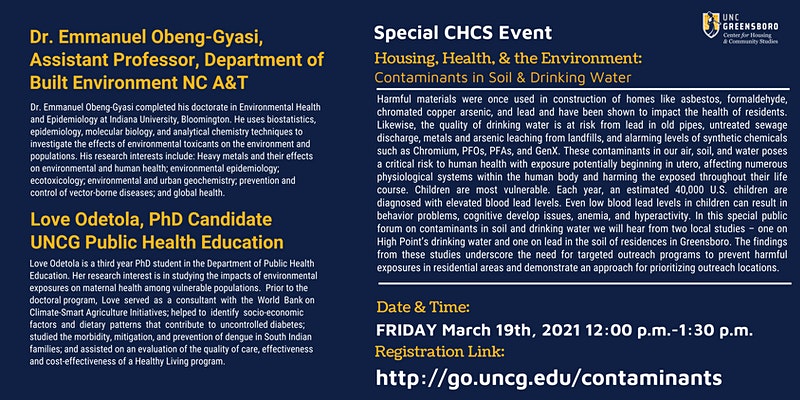Findings from recent research on soil lead exposure risk in Greensboro & contaminants in residential tap water in High Point.
FRIDAY MARCH 19th NOON
REGISTER AT: http://go.uncg.edu/contaminants
Harmful materials were once used in construction of homes like asbestos, formaldehyde, chromated copper arsenic, and lead and have been shown to impact the health of residents. Likewise, the quality of drinking water is at risk from lead in old pipes, untreated sewage discharge, metals and arsenic leaching from landfills, and alarming levels of synthetic chemicals such as Chromium, PFOs, PFAs, and GenX. These contaminants in our air, soil, and water poses a critical risk to human health with exposure potentially beginning in utero, affecting numerous physiological systems within the human body and harming the exposed throughout their life course. Children are most vulnerable. Each year, an estimated 40,000 U.S. children are diagnosed with elevated blood lead levels. Even low blood lead levels in children can result in behavior problems, cognitive develop issues, anemia, and hyperactivity. In this special public forum on contaminants in soil and drinking water we will hear from two local studies – one on High Point’s drinking water and one on lead in the soil of residences in Greensboro. The findings from these studies underscore the need for targeted outreach programs to prevent harmful exposures in residential areas and demonstrate an approach for prioritizing outreach locations.
Speakers:

Presenting from his recent publication:
Obeng-Gyasi, E., Roostaei, J., and MacDonald Gibson, J. (2021) “Lead Distribution in Urban Soil in a Medium-Sized City: Household-Scale Analysis.” Environmental Science & Technology. https://doi.org/10.1021/acs.est.0c07317

Presenting from her recent publication:
Odetola, L., Sills, S., and Morrison, S. (Forthcoming) “A Pilot Study on the Feasibility of Testing Residential Tap Water in North Carolina: Implications for Environmental Justice and Health.” Journal of Exposure Analysis and Environmental Epidemiology (under review).
